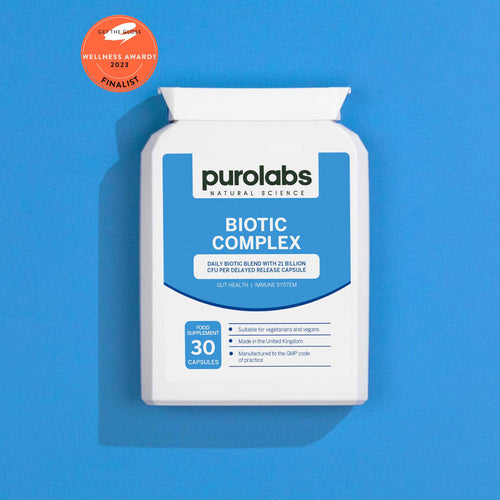Gut health is the trending health topic of the moment, and for good reason. In recent years, studies are increasingly unearthing the incredible ways in which our gut drives and modulates our health and wellbeing.
The gut is still a relatively unexplored part of the human body, due to its sheer size and capacity, filled with trillions of microorganisms (our gut microbiome) which outnumber human cells by an astonishing 10 to 11.To put it into perspective, the surface area of our intestines if laid out, would fill almost half the ground of a badminton court! 2
A healthy gut microbiome supports our health in various ways:
- It helps modulate our immune system to tackle viral and bacterial infections3
- Gut microbes create many neurotransmitters, affecting well-being, brain health and sleep4,5
- They protect us from inflammatory and chronic health conditions6
- Helps us to absorb nutrients effectively to support hair, skin and nail health7
- A healthy microbiome has even been shown to aid in weight management8
The phrase ‘you are what you eat’ has never been more relevant when it comes to gut health. Your gut microbiome quite literally feeds off the nutrients you give it to support bodily processes required to protect and nourish your body.
So, with that in mind, what can we do to help support a thriving microbiota to optimise our gut health? Read on…
Increase probiotic intake
Our gut microbiome needs a favourable amount of beneficial aka ‘good’ to ‘bad’ bacteria to thrive. Ingesting probiotics help to populate and nourish the gut with beneficial bacteria, helping to keep the balance of the gut in favour of the good guys.
You can take probiotics in either supplemental or food form but be mindful of taking too much too soon. The microbiome needs time to adjust, so increase your probiotic intake gradually over the course of few days to mitigate any digestive upset in the process.

Biotic Complex
Increase prebiotic rich foods.
Prebiotic foods (easily confused with probiotics) are food supply for our gut bugs and are mostly found in high fibre foods. Feeding the good bacteria in our gut with prebiotics strengthens our defences against pathogenic bacteria9.
Examples include:
- Garlic
- Onions
- Kiwis
- Bananas
- Artichoke
Improve digestion
What’s inside our gut is just as important as its structure and how it works to move food through the body.
Adding prokinetic foods like ginger and artichoke can help stimulate peristalsis (muscle movement) within the digestive tract to help move food along. This helps to reduce bloating caused from food fermentation and helps to reduce constipation. Win win!
Adding bitter foods also help to stimulate digestive juices in the gut to help break down and absorb nutrients from our food. Consider adding dandelion, rocket, turmeric, and cumin to your diet to help improve digestion.
Eating vegetables from the Brassica family have an incredibly beneficial impact on our gut health. Cabbage, broccoli, and brussels sprouts have been shown to help repair the gut lining, by creating compounds like indole-3-carbinol (I3C). These compounds bind to receptors in the gut lining to strengthen it10.
Increase protein intake
Amino acids which are derived from the protein we ingest are the building blocks for many processes within the body. Our gut bugs digest and metabolise amino acids to create almost every neurotransmitter found in the brain! Our gut bacteria also produce neurotransmitters like serotonin, which live in the gut and help our gut to digest food11.
A varied diet leads to a varied microbiome so ensure that you opt for a variety of protein sources. Plant proteins such as beans, legumes and chia seeds increase beneficial bifidofacterium & lactobacillus along with protecting us against inflammatory Bacteroides in the gut12.
Prioritise stress management
Modern living means we simply can’t avoid the inevitable daily stressors we all face. Although stress cannot be avoided, putting daily practices in place to help manage it better is vital for good gut health.
Practices can be as simple as going for a stroll, talking to a loved one, taking a relaxing bubble bath or reading a good book. Sleep quality is key to stress management so ensure you have a simple and easy bedtime routine to clock those all-important 8 hours of rest.
Magnesium has been shown to help promote calmness and aid relaxation for a good night’s sleep.13 Consider supplementing with magnesium to help provide daily nervous system support.

Magnesium Citrate
Limit processed food intake
We all love a takeaway or sweet treat from time to time; it’s one of life’s simple pleasures. Although processed foods can be enjoyed on occasion, it’s important to note that they shouldn’t play a key role in daily dietary intake.
A typical Western diet, high in ultra-processed foods, has been shown to have an inflammatory effect on the gut microbiome due to an increase in pathogenic bacteria 14.
Increase the colour on your plate
To put it simply; more colour means more nutrients and a variety of nutrients are needed for a healthy, thriving, and diverse gut microbiome15.
Next time you visit the supermarket, aim to try new produce each week and focus on adding different colours to your basket for optimal gut health. Red fruit and vegetables for example are typically high in antioxidants and vitamin C whilst orange and yellow produce are abundant in vitamin A.
Move your body
Moving your body helps with stress management which as we mentioned, is key for good gut health. Moving your body in a way that’s enjoyable to you, releases feel-good hormones and stimulates peristalsis of the gut to help keep constipation at bay.
Exercise is also linked to an increase in beneficial gut bacteria by enhancing short-chain fatty acid metabolism aka the breakdown of carbohydrates. This essentially means that exercise allows our microbiome to break down and utilise carbs better!
Stay hydrated
A 2022 study16 found that people who drank more water had less of a pathogenic type of bacteria linked to gastrointestinal infections.
Staying hydrated also helps reduce constipation (we talk a lot about constipation in this article) which, we know is vital for a healthy functioning gut.
Aim for 1.5-2 litres water daily. Caffeinated beverages including tea, coffee and energy drinks don’t count towards this target. Water, herbal teas and low-sugar juices however, do count.
Avoid ‘all day’ grazing
Having a life that’s ‘on the go’ with family, friends and work commitments means that taking the time to sit down to three balanced meals a day can be tricky.
Grabbing foods for convenience and eating little and often without mindful consuming becomes the norm (we’ve all been there!).
All day grazing without structure means that the gut doesn’t have time between meals to fully digest the foods we eat. Allowing several hours between meals improves digestion, absorption, and excretion of the foods we eat for optimal gut health.
The tips above will help to reduce common digestive complaints experienced such as flatulence, bloating and constipation.
If you have ongoing or severe digestive complaints, or you have been diagnosed with a condition which affects your digestive system, then check with a qualified health practitioner before implementing these tips.

 Beauty
Beauty
 Bone Health
Bone Health
 Brain Health
Brain Health
 Energy
Energy
 Eye Health
Eye Health
 Gut Health
Gut Health
 Hair
Hair
 Hormonal Health
Hormonal Health
 Heart Health
Heart Health
 Immunity
Immunity
 Joints
Joints
 Menopause
Menopause
 Pregnancy
Pregnancy
 Kids
Kids
 Sleep
Sleep
 Stress & Mood
Stress & Mood




















